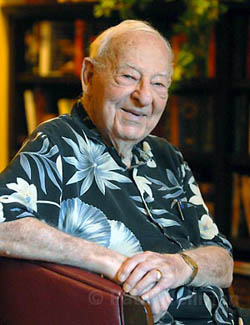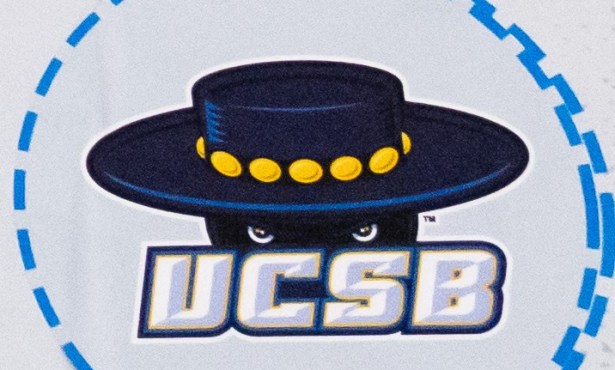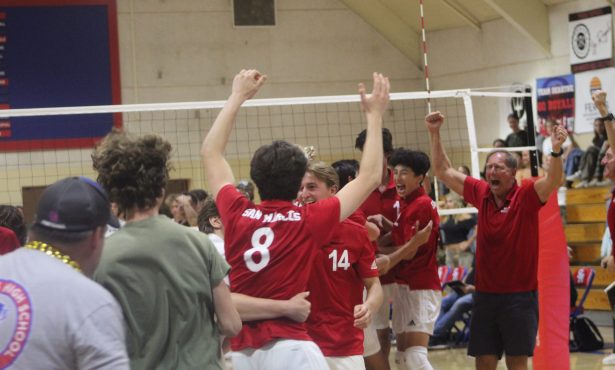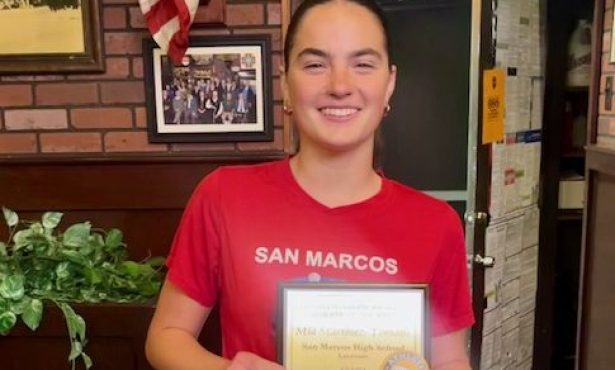The Continuing Legacy of Jerry Harwin
The Knight of the Round Table
Jerry Harwin has assumed the same role at the Maravilla Senior Living center in Goleta he performed in the community at large during the prime of his life: He is a mover and a shaker. His domain now is the dance floor. He moved in rhythmic circles around younger staff members last week to the upbeat tune of the ’60s Motown hit, “Do You Love Me.”

“Wine, women, and song-not necessarily in that order-keep me going,” said Harwin, who is dancing toward his 96th birthday. “Song has to come first. I love music, and I love to dance.”
It was business, sports, and recreation that defined Harwin’s impact on Santa Barbara. His major legacies are Elings Park, the former landfill that was transformed into a recreational site under his leadership (the access road is named “Jerry Harwin Parkway”); and the Santa Barbara Athletic Round Table, an organization that supports local schools and individuals in their athletic pursuits.
On the occasion of the Round Table’s 40th annual banquet on Monday night, Harwin and Bill Bertka received Founder’s Awards. Harwin was the first president of the organization. It was conceived in 1967 in an upstairs room at Caesar’s, a restaurant on State Street next to Harwin Jewelry.
“Caesar Uyesaka, Phil Patton, and I were eating lunch, talking about sports,” Harwin recalled. “We thought maybe we should start something that involves all the schools and sports in town.”
Bertka, the city’s recreation director, joined their effort. Patton, the sports editor of the News-Press at the time, publicized the venture. The Round Table made its first big splash in 1968 by inaugurating the Santa Barbara Athletic Hall of Fame. In 1970, it began hosting the Monday luncheons that are still a sports staple from September to May at Harry’s Plaza Cafe.
The two hearts at the center of the enterprise, beating as one, belonged to Harwin and Uyesaka. “We were known as ‘The Gold Dust Twins,'” Harwin said. “Caesar was my best friend, closer to me than my own twin brother. I met him as a member of the Lions Club. Caesar took me to a Santa Barbara State College (forerunner of UCSB) basketball game at the National Guard armory. We started the Gaucho Hoop Club. Basketball is my favorite sport. Caesar loved baseball.”
When minor-league baseball came to Santa Barbara in the ’60s, Harwin and Uyesaka were there to help run things. First came the Rancheros, an affiliate of the New York Mets, then the Santa Barbara Dodgers became the occupants of Laguna Park in 1964. “When the Dodgers came to town, it was a big day in Caesar’s life,” Harwin said. “He and I would be at the games smoking cigars.”
But they hardly fit the mold of the wealthy owners. “We couldn’t afford a lot of baseballs,” Harwin said. “I would sit behind the backstop, wipe the smudges off discarded balls, and try to make them look like new.” After four seasons here, the Dodgers moved the California League team to Bakersfield. Laguna Park lay vacant, and it was torn down in 1970-“One of the worst things that happened,” Harwin said. But he and Uyesaka continued to put their energies into Santa Barbara sports.
Harwin was the showman. He would sit at the head table during the Monday luncheons with a clock and hit any speaker who droned on too long with a jab to the thigh. Uyesaka was a behind-the-scenes benefactor. UCSB’s baseball stadium is named after him. Both of them found a place in the mainstream through sports.
“When Caesar died, I was asked to give the eulogy,” Harwin said. “I ended it by saying, ‘Where but in the United States of America would you find a Jewish person giving a eulogy for a Japanese man in a Protestant church?'”.



